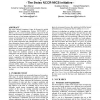995 search results - page 196 / 199 » Gossip-based ad hoc routing |
143
click to vote
WINET
2011
14 years 8 months ago
2011
Sleep scheduling, which is putting some sensor nodes into sleep mode without harming network functionality, is a common method to reduce energy consumption in dense wireless sensor...
124
Voted
CN
2007
15 years 1 months ago
2007
In recent years, network mobility (NEMO) has been studied extensively due to its potential applications in military and public transportation. NEMO basic support protocol (NBSP), ...
118
Voted
ECRTS
2007
IEEE
15 years 8 months ago
2007
IEEE
Since wireless ad-hoc networks use shared communication medium, accesses to the medium must be coordinated to avoid packet collisions. Transmission scheduling algorithms allocate ...
207
click to vote
SIGMOD
2006
ACM
16 years 2 months ago
2006
ACM
The Swiss National Competence Center for Research in mobile Information and Communication Systems (NCCR-MICS or MICS) is one of several research initiatives sponsored by the Swiss...
122
click to vote
MOBIHOC
2004
ACM
16 years 1 months ago
2004
ACM
In the near future, the advent of large-scale networks of mobile agents autonomously performing long-term sensing and communication tasks will be upon us. However, using controlle...

